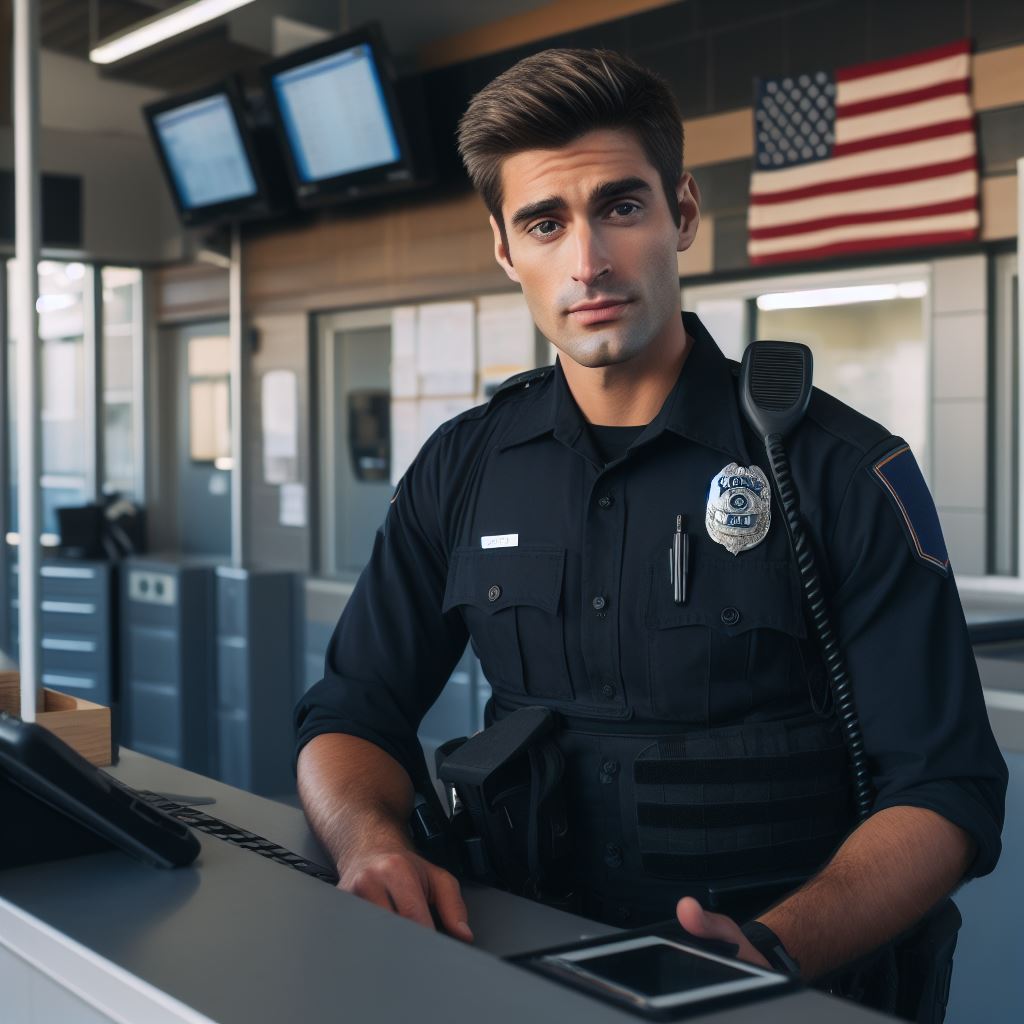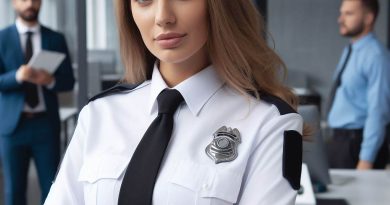Understanding the Police Academy Training Process
Last Updated on January 27, 2024
Introduction
Understanding the Police Academy Training Process is crucial for aspiring law enforcement officers. Without knowing what it entails, it is difficult to prepare adequately.
This blog post aims to provide an overview of the training process and its importance.
Importance of understanding the Police Academy Training Process
Comprehending the Police Academy Training Process allows aspiring officers to have realistic expectations. It helps them mentally and physically prepare for the challenges they will face during training.
Moreover, knowing the training requirements can motivate individuals to work towards meeting them.
Overview of what the blog post will cover
This blog post will cover various aspects of the Police Academy Training Process.
It will start by explaining the basic requirements for admission into the academy, such as age limits, educational qualifications, and background checks.
Next, it will delve into the physical fitness standards and training exercises that candidates must undergo.
The blog post will then discuss the classroom instruction and practical training offered at the academy.
It will highlight the topics covered, such as law enforcement procedures, criminal law, self-defense techniques, and emergency response protocols.
Additionally, it will touch upon the importance of teamwork, communication skills, and ethical conduct.
Furthermore, the post will shed light on the rigorous nature of the training process, including long hours, intense physical demands, and psychological stressors.
It will emphasize the need for discipline, resilience, and mental fortitude to succeed.
Lastly, the blog post will conclude by underscoring the significance of knowing the Police Academy Training Process to adequately prepare for a law enforcement career.
It will encourage aspiring officers to seek further resources and support to maximize their chances of success.
Understanding the Police Academy
Definition of a Police Academy
A police academy is a specialized institution where individuals receive training to become law enforcement officers.
- The purpose of a police academy is to prepare recruits for the challenges they will face on the job.
- Police academies provide a comprehensive curriculum that includes both theoretical and practical training.
- The training at a police academy is rigorous and demanding, intended to simulate real-life situations.
Role of the Police Academy in law enforcement training
The police academy plays a crucial role in the training of law enforcement officers.
- The academy ensures that recruits develop the necessary skills and knowledge to perform their duties effectively.
- . Recruits learn about the legal framework within which law enforcement operates, including constitutional rights.
- Physical fitness training is a significant component of police academy programs to ensure officers can handle physical challenges.
- The academy trains recruits on the use of firearms and other necessary equipment, emphasizing safety and proper handling.
- Communication skills training is essential for officers to effectively interact with the public and colleagues.
- Practical scenarios and simulations help recruits learn how to make split-second decisions and handle stressful situations.
- Ethics and integrity training are emphasized to ensure officers maintain high standards of professionalism.
- The academy also educates officers about community policing and the importance of building positive relationships with the public.
- Training in cultural sensitivity and diversity helps officers deal with diverse populations and handle various situations respectfully.
- Ongoing training and professional development are provided to officers throughout their careers to enhance their skills.
- The police academy instills a sense of discipline, teamwork, and commitment to public service among recruits.
- Graduation from the police academy indicates that recruits have met the required standards to become law enforcement officers.
In general, the police academy is a vital institution that prepares individuals for the challenging and diverse role of a law enforcement officer.
Its comprehensive training curriculum ensures that officers possess the necessary skills, knowledge, and professionalism to serve and protect their communities effectively.
Admission Process
Entry requirements for Police Academy
- The Police Academy has specific requirements that applicants must meet.
- Applicants must be at least 21 years old and have a high school diploma or GED.
- They must be citizens or legal residents of the country where the Police Academy is located.
- Some academies may require a certain number of college credits or a college degree.
- Applicants must have a valid driver’s license and clean driving record.
- Previous military experience or law enforcement-related education may be advantageous but is not always required.
Background checks and screenings
- All applicants for the Police Academy undergo comprehensive background checks.
- This process includes an examination of their criminal records and personal history.
- Any history of criminal activity or serious misconduct may disqualify an applicant.
- Applicants may be required to submit to polygraph tests to verify their truthfulness and integrity.
- Character references from employers, teachers, or community members may also be requested.
- Psychological evaluations are often conducted to assess an applicant’s mental and emotional suitability for the job.
Physical fitness evaluation
- Physical fitness is a vital aspect of police work, and applicants must undergo rigorous evaluations.
- These evaluations typically include tests of strength, endurance, agility, and cardiovascular fitness.
- Applicants may be required to perform tasks such as running, push-ups, sit-ups, and obstacle courses.
- The purpose of these tests is to ensure that candidates have the physical capabilities required for police work.
- Individuals who are unable to meet the fitness standards set by the Police Academy may not be admitted.
Meeting the entry requirements, passing background checks, and excelling in physical fitness evaluations are essential steps in the police academy admission process.
It is crucial for applicants to thoroughly prepare themselves and ensure they meet all the necessary criteria.
The academy’s goal is to train and develop individuals who are qualified and capable of serving as effective law enforcement officers.
Carefully selecting candidates based on abilities, character, and fitness, the academy aims to produce skilled and responsible police personnel upholding justice principles and community protection.
This approach is crucial for police training, personnel quality, and community safety.
Stay tuned for the next section where we will discuss the training curriculum and the different aspects of the police academy learning process.
Duration of Training
Length of Police Academy training programs
- Police Academy training programs vary in duration depending on the country and state.
- In the United States, most Police Academy programs last around 6 to 9 months.
- However, some states like California and New York have longer training programs, up to 6 to 9 months.
- The length of training also depends on the specific requirements and curriculum set by each academy.
Different phases or stages of training
- Police Academy training is divided into several phases to provide a comprehensive education.
- The initial phase focuses on classroom instruction, covering topics such as law, ethics, and procedures.
- Trainees also undergo physical fitness training to prepare them for the demands of the job.
- In the next phase, trainees learn practical skills such as firearms training, defensive tactics, and emergency response.
- This phase includes hands-on training, simulations, and scenario-based exercises to enhance practical knowledge.
- Trainees are also introduced to community policing and interpersonal skills to build relationships with the public.
- The final phase of training involves field training where trainees work alongside experienced officers.
- This phase allows trainees to apply their knowledge in real-life situations under the supervision of seasoned professionals.
Intensity and demands of the training process
- Police Academy training is known for its intense and demanding nature.
- Trainees are required to maintain high physical fitness levels throughout the training.
- The training process includes rigorous physical exercises, endurance tests, and obstacle courses.
- Additionally, trainees undergo extensive firearms training to ensure they can handle weapons efficiently.
- The mental demands of the training process are equally challenging.
- Trainees are taught decision-making skills, problem-solving techniques, and the ability to remain calm under pressure.
- They must learn to communicate effectively, both verbally and in writing, to document incidents accurately.
- The training process also includes regular evaluations and assessments to monitor the trainees’ progress.
- Trainees must meet specific performance standards and pass written and practical exams to graduate.
- The demands of the training process ensure that only the best candidates become police officers.
In summary, the duration of Police Academy training programs varies, with most lasting around 6 to 9 months.
The training is divided into different phases, including classroom instruction, practical skills training, and field training.
The intensity and demands of the training process are high, requiring trainees to maintain physical fitness, undergo rigorous exercises, and develop mental resilience.
The training process aims to equip aspiring police officers with the necessary knowledge, skills, and abilities to serve and protect their communities effectively.
Read: Key Skills Every U.S. Firefighter Must Possess
Curriculum and Areas of Study
Overview of the subjects covered in Police Academy training
- Criminal Justice System: Understanding the structure and function of the criminal justice system.
- Police Ethics: Learning about ethical principles and code of conduct expected from police officers.
- Patrol Procedures: Gaining knowledge on patrolling techniques, including vehicle operations and traffic enforcement.
- Investigation Techniques: Acquiring skills in crime scene investigation, evidence collection, and interviewing witnesses.
- Use of Force: Understanding the policies and procedures regarding the appropriate use of force by police officers.
- Crisis Intervention: Learning methods to handle situations involving mental health crises and de-escalation techniques.
Importance of constitutional law and understanding legal procedures
- Constitutional Law: Studying the U.S. Constitution, Bill of Rights, and other relevant laws that govern law enforcement actions.
- Legal Procedures: Understanding the legal process, including arrest, search and seizure, and criminal procedure.
- Civil Rights: Ensuring that officers respect and protect the civil rights of all individuals in the community.
- Courtroom Testimony: Learning how to present evidence effectively and testify in court as a law enforcement officer.
Practical training sessions and simulations
- Firearms Training: Developing proficiency in firearms handling, marksmanship, and tactical shooting.
- Defensive Tactics: Acquiring skills in self-defense, arrest techniques, and control tactics.
- Emergency Response: Training for emergency situations such as active shooters, terrorism incidents, and natural disasters.
- Vehicle Operations: Learning safe driving techniques and pursuit driving strategies.
- Communication Skills: Developing effective communication techniques for interacting with the public and colleagues.
- Role-playing Exercises: Participating in scenarios that simulate real-life policing situations to enhance decision-making skills.
Hands-on Experience
- Ride-Along Programs: Observing and assisting experienced officers during their shifts to gain practical insights.
- Field Training: Applying theoretical knowledge in real-world situations under the guidance of experienced trainers.
- Community Engagement: Engaging with the community through outreach programs and community policing initiatives.
Aspiring police officers go through a comprehensive curriculum addressing various aspects of law enforcement.
The training covers subjects such as the criminal justice system, police ethics, investigation techniques, and crisis intervention.
Understanding constitutional law and legal procedures is vital to ensure officers operate within legal boundaries and protect individuals’ rights.
Practical training sessions and simulations play a crucial role in developing essential skills like firearms handling, defensive tactics, and emergency response.
Hands-on experiences, such as ride-along programs and field training, provide valuable insights into the realities of policing and foster community engagement.
By equipping future officers with a well-rounded education, the police academy strives to produce competent and responsible law enforcement professionals.
Read: Fire Department Hierarchies: From Rookie to Chief
Physical Training and Fitness
Importance of physical fitness for police officers
- Physical fitness is crucial for police officers to effectively perform their duties.
- It enhances their ability to handle physically demanding situations and combat threats.
- A physically fit officer can chase, apprehend, and restrain suspects with less risk of injury.
- Maintaining good physical health also contributes to mental well-being and overall job satisfaction.
- physical fitness reduces the chances of developing health issues associated with a sedentary lifestyle.
Components of physical training in the Police Academy
- The Police Academy focuses on various components of physical training to prepare recruits.
- Endurance training improves cardiovascular health and helps officers cope with prolonged physical exertion.
- Strength training builds necessary muscle mass for tasks involving physical force.
- Agility training enhances quick reflexes and coordination, crucial during pursuits or confrontations.
- Flexibility training aims to improve joint mobility, reducing the risk of injuries during physical activities.
- Balance and stability training are essential for maintaining control during challenging situations.
- Additionally, recruits undergo specialized training in firearms, defensive tactics, and tactical movement.
Importance of self-defense and combat training
- An integral part of police academy training is self-defense and combat training.
- Officers need to be equipped with the skills to protect themselves and others from harm.
- Self-defense training includes techniques to subdue suspects without resorting to excessive force.
- It emphasizes proper control and restraint techniques, minimizing the risk of unnecessary injury.
- Combat training hones officers’ skills in handling high-intensity situations, such as armed confrontations.
- Training in martial arts and defensive tactics helps develop confidence and quick decision-making.
- Combat training also focuses on situational awareness and de-escalation techniques to avoid unnecessary violence.
Physical training and fitness are integral to shaping adept police officers, crucial for the demanding nature of law enforcement careers.
Police departments prioritize physical fitness, ensuring officers are well-prepared for their challenging roles.
Recruits undergo comprehensive training covering endurance, strength, agility, flexibility, balance, and stability.
These components collectively enhance officers’ physical capabilities, crucial for emergencies and dynamic situations.
Self-defense and combat training equip officers with the skills to handle various scenarios, emphasizing control and de-escalation.
Over all, police academy training prioritizes physical fitness and equips officers with self-defense and combat skills.
This comprehensive preparation ensures officers can effectively serve and protect their communities, minimizing the risk of injuries to themselves and others.
A physically fit and skilled officer stands well-prepared for the diverse physical demands and challenges inherent in their profession.
Read: Volunteer Firefighters: The Unsung Heroes in the U.S.

Firearms Training
The significance of firearms training for police officers
Firearms training is a critical aspect of police academy training as it equips officers with the necessary skills and knowledge to handle firearms safely and effectively in the field.
The training ensures that officers are prepared to protect themselves and the public.
Confidence and competence
Firearms training instills confidence in officers, enabling them to handle firearms with competence and accuracy. This confidence is essential for law enforcement officers to carry out their duties effectively.
Life-saving skills
Firearms training teaches officers how to use their weapons to save lives, both their own and others. Proper training can mean the difference between life and death in high-risk situations.
Defending against armed suspects
Police officers often face armed suspects in the line of duty. Firearms training equips them with the skills to defend themselves and neutralize threats encountered during dangerous situations.
Safety protocols and handling firearms
Strict safety measures
Firearms training emphasizes the importance of following strict safety protocols, including always treating firearms as if they are loaded, keeping fingers off the trigger until ready to shoot, and pointing the weapon in a safe direction.
Proper storage and maintenance
Officers are taught proper storage and maintenance techniques for firearms to prevent accidents and ensure their weapons are always in a functional and safe condition.
Understanding ammunition
Police officers learn about different types of ammunition and how to properly load, unload, and handle them to ensure optimal performance and reduce the risk of malfunctions.
Different types of weapons and their usage in law enforcement
Handguns
Handguns are the most commonly used firearms by police officers. They are carried as sidearms and provide officers with a compact and easily accessible self-defense weapon.
Shotguns
Shotguns are highly effective at close-range encounters and are commonly used in situations that require a higher stopping power, such as barricaded suspects or when dealing with volatile crowds.
Rifles
Rifles are long-barreled firearms that are typically used by law enforcement in scenarios that demand increased accuracy and range, such as active shooter situations or rural operations.
Less-lethal options
In addition to firearms, police officers are trained to use less-lethal weapons like tasers, pepper spray, and batons.
These tools offer officers the ability to de-escalate situations without resorting to deadly force whenever possible.
Firearms training is an essential part of the police academy training process. It equips officers with the skills and knowledge necessary to handle firearms safely, confidently, and effectively while ensuring public safety.
By following strict safety protocols and understanding the different types of weapons available, officers are better prepared to protect themselves and the communities they serve.
Read: Rituals and Traditions in U.S. Firefighting Culture
Learn More: Pay, Benefits, & Retirement: The Financial Side of Policing
Scenario-Based Training
Scenario-based training is a crucial component of the Police Academy curriculum.
Through simulations and role-plays, cadets are prepared to handle real-life situations and emergencies that they may encounter as police officers.
Simulations and role-plays in the Police Academy
Simulations and role-plays provide cadets with a hands-on approach to learning. They allow them to apply the knowledge and skills they have acquired in a controlled and safe environment.
By actively participating in various scenarios, cadets gain practical experience that cannot be obtained through traditional classroom lectures alone.
Preparing officers for real-life situations and emergencies
One of the main objectives of scenario-based training is to prepare future officers for real-life situations they may encounter on duty.
From traffic stops to hostage situations, cadets are exposed to a wide range of scenarios that they may face in their law enforcement careers.
By experiencing these situations in a controlled environment, cadets are better prepared to respond effectively when they occur in real life.
Importance of decision-making and critical thinking skills
Decision-making and critical thinking are pivotal for law enforcement, honed through scenario-based training in the Police Academy.
Cadets practice making split-second decisions, analyzing situations, and determining appropriate actions.
Repeated engagement in realistic scenarios enhances their proficiency under pressure, preparing them for unpredictable real-life situations.
This training encourages cadets to think critically, evaluating the consequences of their actions. Each decision made holds significant implications for themselves and the community.
Analyzing outcomes deepens their understanding of decision-making’s impact.
Scenario-based training fosters teamwork and effective communication, crucial in high-stress environments where collaboration is essential.
This training is vital in the Police Academy curriculum, allowing cadets to apply knowledge and skills realistically.
By emphasizing decision-making and critical thinking, it equips cadets to make effective choices under pressure, ensuring they graduate well-prepared to protect and serve their communities.
Evaluations and Graduation Requirements
Assessments and evaluations during Police Academy training
- Trainees undergo regular assessments to gauge their progress and competence in various areas.
- Evaluations cover physical fitness, academic knowledge, tactical skills, and ethical behavior.
- These assessments aim to ensure trainees are meeting the required standards set by the academy.
- Trainees receive feedback and guidance based on their performance in the evaluations.
- Continuous evaluations help identify areas of improvement and address any deficiencies promptly.
- Trainees must demonstrate proficiency in handling firearms and other law enforcement equipment.
- Performance evaluations also include scenarios to test decision-making and critical thinking abilities.
- The evaluations during Police Academy training help determine trainees’ readiness for real-world policing.
- Feedback from experienced instructors is crucial for trainees to develop necessary skills and expertise.
- Assessments play a vital role in ensuring that only qualified and capable individuals become police officers.
Graduation requirements and standards
- Successful completion of all required courses and training modules is necessary for graduation.
- Trainees must attain a passing grade in both academic and practical exams to meet graduation requirements.
- Physical fitness tests, such as running, obstacle courses, and strength assessments, are also part of the standards.
- Trainees are expected to maintain a certain level of physical fitness throughout the entire training process.
- Adherence to the academy’s code of conduct and ethical standards is a fundamental requirement for graduation.
- Trainees must demonstrate adequate knowledge and understanding of constitutional rights and laws.
- To graduate, trainees must exhibit competent skill levels in defensive tactics and self-defense techniques.
- The academy also evaluates trainees’ ability to effectively communicate and interact with diverse communities.
- Academic excellence and consistent demonstration of professionalism are highly valued for graduation.
- Once all graduation requirements are met, trainees become certified police officers and can enter the field.
Remedial training and support for struggling trainees
- In cases where trainees are struggling academically or physically, remedial training and support programs are implemented.
- Trainees who require additional assistance receive personalized coaching and mentoring.
- Academy staff work closely with struggling trainees to identify their specific needs and develop improvement plans.
- Remedial training focuses on providing trainees with extra practice and guidance to enhance their skills.
- Through targeted support, struggling trainees are given the opportunity to catch up and succeed in the program.
- The aim of remedial training is to ensure all trainees meet the required standards for graduation.
- Regular evaluations and feedback help monitor the progress of struggling trainees and adjust support accordingly.
- The academy believes in providing every trainee with the resources and assistance needed to succeed.
- By offering remedial training and support, the academy aims to produce competent and well-rounded officers.
- Trainees who successfully complete remedial programs can graduate alongside their peers, ready for police work.
Through rigorous evaluations, graduation requirements, and remedial support, the Police Academy ensures that trainees are adequately prepared to serve as competent and responsible police officers.
Gain More Insights: Famous Real-Life Detectives and Their Legendary Cases
Conclusion
Recap of topics covered in the blog post
In this blog section, we explored the Police Academy training process, diving into its various aspects. We discussed the curriculum, physical fitness requirements, firearms training, and legal knowledge.
Importance of understanding the Police Academy training process for aspiring police officers
Understanding the Police Academy training process is vital for aspiring police officers.
It provides insight into the rigorous training they must undergo to become efficient and effective law enforcement professionals.
This knowledge helps individuals prepare mentally and physically for the challenges they will face.
Encouragement for further research and preparation
If you are serious about pursuing a career in law enforcement, it is crucial to further research and prepare for the Police Academy training process.
In addition to the knowledge gained through this blog section, talking to current or former officers, participating in ride-alongs.
And studying relevant materials will provide you with a comprehensive understanding of what to expect.
Remember, the Police Academy training process is demanding, both mentally and physically.
However, with dedication, determination, and proper preparation, you can overcome the challenges and embark on a rewarding career in law enforcement.


